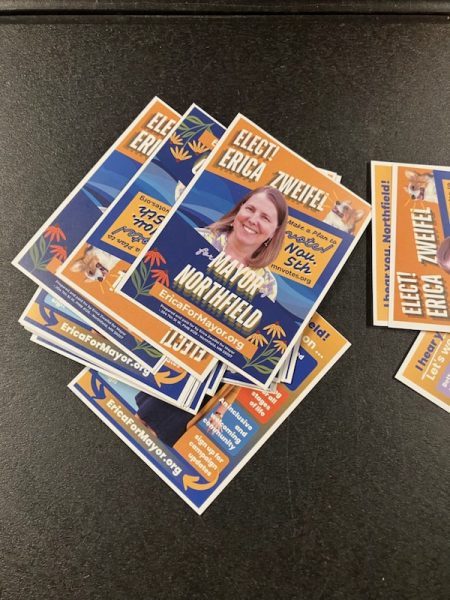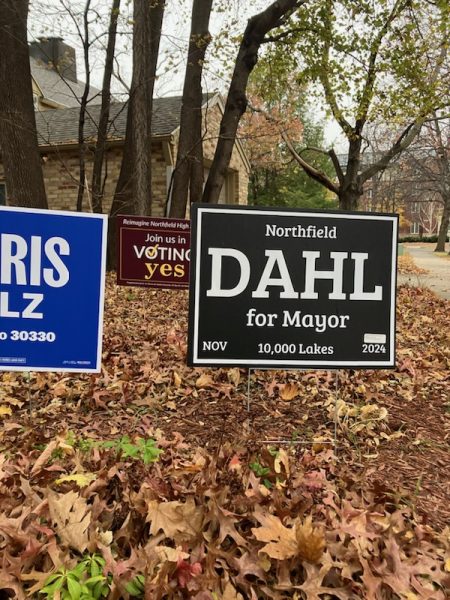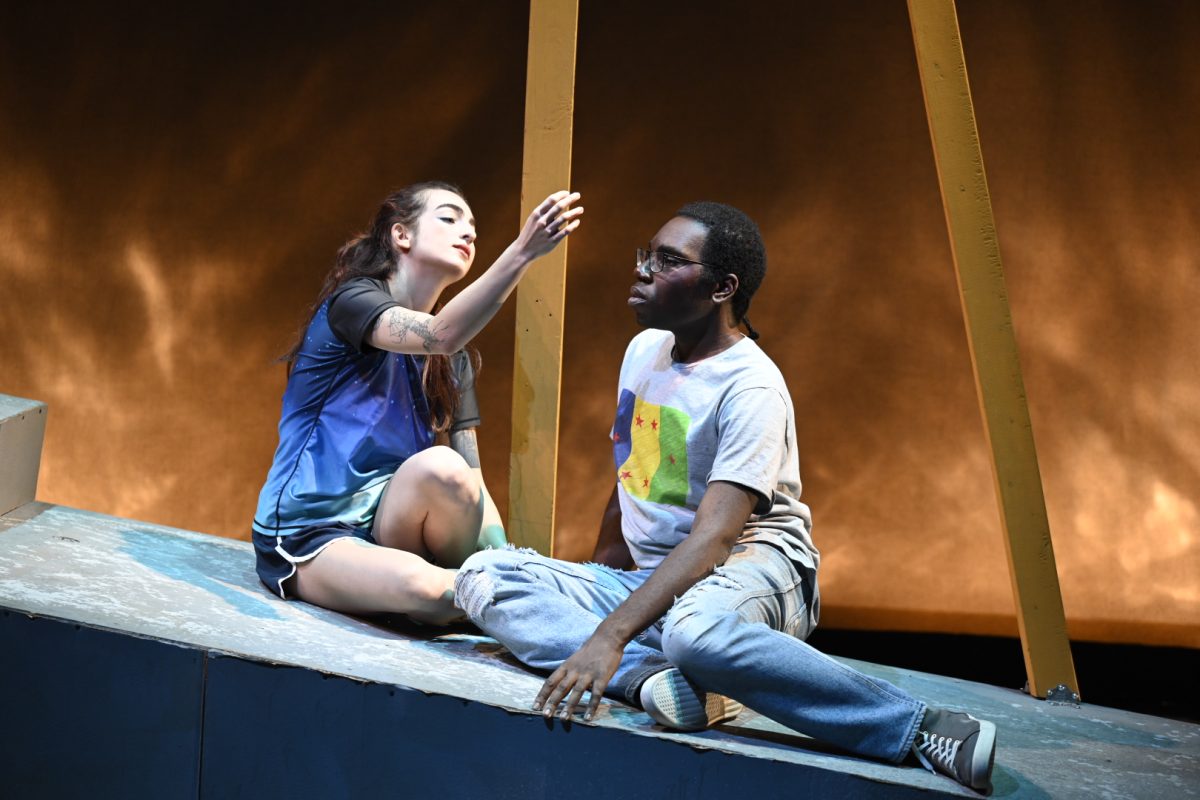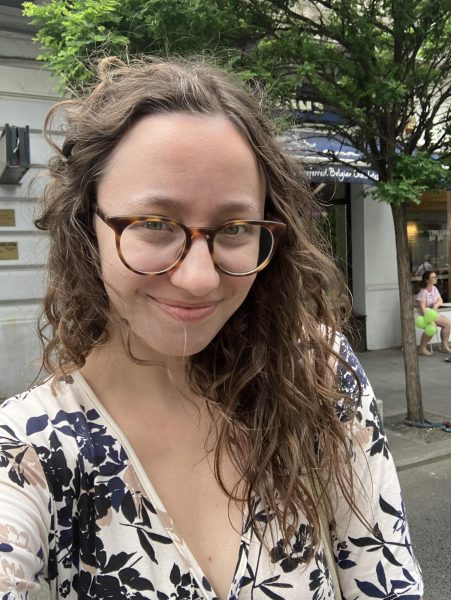Erica Zweifel wants to increase civic engagement in Northfield. Ruth Dahl wants to make Northfield more fiscally responsible. Next Tuesday, one of them will be elected as the next mayor of Northfield.

In August, Dahl and Zweifel took the first two spots in a seven-person primary to run in the general election. Dahl, a former member of the Northfield School Board, won 38% of the vote. Zweifel, a former City Council member, won 33%. Incumbent Rhonda Pownell had the third most voted-for candidate with 13% of the vote. Since the election is non-partisan, all candidates compete in one primary and the top two continue into the general election, which will take place on Tuesday, Nov. 5.
Zweifel’s platform includes three main points: fiscal responsibility, civic engagement and economic development. She told the Carletonian that her first priority, if elected, would be “rebuilding trust.”
“I feel like the public…is really frustrated,” said Zweifel. “They don’t understand all the projects that are happening. So a lot of projects just ended up getting stacked up.” The issue with that, she explained, is that people ended up being worried about taxes raising the cost of living too much.
“My first order of business is to try to rebuild that trust, get back out in front of community engagement so people are being heard…[and] so we can all get back to working together,” she continued.
Dahl’s platform focuses on city finances: she wants to reduce local spending and increase opportunities for developers to come into Northfield. She listed a similar first priority of fixing what she described as a “communication gap” between the city government and the people of Northfield.
“City Hall is spending money at a rapid, rapid pace, which we can’t continue, and the voters feel ill informed,” said Dahl. “The property owners [feel ill informed] and they’re paying all the bills. The property tax owners are paying all the bills for the city. So I think we have to improve that communication area.”
Dahl also brought up prioritizing internal communication within the city government.
Aside from agreeing on the need for better communication from the city government and the people of Northfield, however, Zweifel and Dahl have strikingly different priorities.
On Tuesday, Northfield is hosting a referendum on the Northfield High School Construction Project, which would allow the Northfield School District to borrow money to complete projects including renovating the high school, building a new gymnasium and installing a geothermal heating, ventilating and cooling system. Each of those projects is its own ballot measure, so voters will separately vote to approve the bonds and each of those projects. If voters vote no on the bonds, none of the other three projects can occur. Paying off the bonds would require raising property taxes.
“I support the school district levy, and I hope that all three questions will get yesses,” said Zweifel. “Three is the geothermal [system]…I’m sure Carleton students will appreciate the impact of having [a] geothermal system and the long-term savings that that affords you. So I’m hopeful for all three questions. Plus, I was talking to Kristie Purcell, our current State Rep., and if Kristie is re-elected, she’s planning to introduce a bill where the state would help schools pay for geothermal. So it would be really nice to get all three yesses, so then we’d be eligible right away for that state financing.”
“I was on the School Board here for 17 years, so I obviously support Northfield,” Dahl began when asked her opinion of the referendum. “I definitely support schools…Even when I was on the school board years ago, they were talking about doing some improvements too. That’s a 60 year old high school, you know, so it probably needs some work.”

Dahl had concerns, however, about the funding of the projects. “We’re digging in the same taxpayer pocket to pay the city’s bills as the school district relies on the property tax [payers] to support the public school system,” she said, citing examples of unnecessary spending such as the new water treatment plant.
When asked directly about how she’ll be voting on the referendum, Dahl declined to answer. “Who you vote for is your own private information…You can vote as you see fit, and that’s what I think about handing out my own personal information. I think it’s private, and it’s up to me to decide who I think is the best, just like I would respect that of everybody else.”
Zweifel and Dahl have different views of how to prioritize the city budget and spending.
Dahl explained that the city is already spending a lot of taxpayer money on projects she considers unnecessary, which includes a new water treatment plant. “We don’t need it,” said Dahl. “89% of the households in Northfield have soft water treatment. The city is talking about softening water, but they don’t give you the kind of soft water you get out of your tap to wash your hair or dishes or laundry. You’ll still need [treatment]…to make that happen.”
She explained that the reason for the water treatment is to filter manganese. “Manganese is a naturally occurring element in the world, and there are no mandates from the federal government, no mandates from the state government that says we need to keep it at a level of this like they do lead or mercury, that’s a different problem,” Dahl said. (Manganese is a heavy metal regulated by the EPA.) “I am absolutely convinced, after talking to another town close by [about] what they do with water treatment for $1 million versus $60 million dollars, and a water quality control board member from the state of Minnesota, that Northfield does not need this.”
Zweifel brought up climate resiliency as one of the issues she cares about: “We’re going to lose a bunch of ash trees because of the Emerald Ash Bore and warming climate,” she said. “We need to be responsive to that in terms of the species of trees that we’re planting [and] the other natural plans that we’re planting…We’re downstream from just about everybody in the watershed. So we need to work regionally on flood mitigation.”
Zweifel worked on flood mitigation in her time at the city council, when they split the police and fire departments into separate buildings and remodeled the fire station to make it more flood resilient. “In 2010…the basement flooded, and then this year, when we had the flood, the building didn’t flood because we did flood mitigation,” she said.
On the subject of city funding, Zweifel had a few things she focused on. “I would like to get to a place where taxes can be more stable,” she said. “I’d like to see them lower because we’re outpacing the capacity for the community to pay for it, and I think people won’t come here…or potentially people will leave as a result of it. If we want to have more economic development and recruit more businesses, [Northfield] needs to be an attractive place for their employees to live.”
When asked how she would pay for projects such as climate resiliency while lowering taxes, Zweifel’s plan was less clear. She talked about how she wouldn’t have voted for the city to own the new ice arena because at $20 million, it doesn’t make sense on a cost-per-person basis based on there being 300 skaters using the facility.
“There are a few things that I know that I would suggest cutting, but I can’t do anything by myself. It’s a council of seven people, so I have some recommendations,” said Zweifel. “If I’m elected, then I’ll work through the council to find some funds.”
Dahl wants to decrease city spending. “We’re spending money and raising taxes at an unlivable rate. Next year they want to raise them 17%, last year it was almost 10%, 17% next year and 15% the following year,” she said. “Northfield, we just can’t sustain that. I’m a taxpayer. I own my home, and I realize what that means.”
“I’m glad I had this opportunity to talk to the college student community because you don’t pay taxes, you probably don’t own property, so it doesn’t have that large meaning that it does to everybody who lives here and pays taxes to keep Northfield going,” Dahl said.
Given the size of Northfield and the size of Carleton and St. Olaf, college students make up a disproportionate percentage of the electorate in Northfield. Students have the opportunity to vote in the mayoral election next Tuesday.














